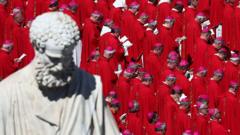The upcoming papal election is characterized by strict secrecy, isolation, and a deep-rooted tradition meant to ensure divine guidance.
Conclave: The Sacred Secrecy Behind the Search for a New Pope

Conclave: The Sacred Secrecy Behind the Search for a New Pope
As 133 cardinals prepare for the secretive conclave, the world watches the ancient traditions of the Catholic Church unfold.
In just days, 133 cardinals are set to gather within the venerable walls of the Sistine Chapel for one of the most closely guarded elections in the world—choosing the successor to Pope Francis. Each cardinal will take an oath on the gospels, pledging to maintain absolute secrecy, alongside every individual present in the Vatican during this conclave. This includes not just the cardinals, but also physicians on standby for medical emergencies and the dining staff, all committed to a pact of "absolute and perpetual secrecy."
To reinforce this commitment, thorough sweeps will ensure the absence of any electronic surveillance within the chapel and the associated guesthouses. John Allen, editor of the Crux news site, asserts, "The Vatican takes the idea of isolation extremely seriously," elaborating on the extensive measures in place, which include not only jamming devices to block cell phone and Wi-Fi signals but also barring all electronic devices like phones and tablets from the participants.
The conclave's lockdown serves dual purposes: preserving the integrity of the voting process and preventing any external influences from infringing upon a decision deemed divinely guided. Once the cardinals enter, they will live without the distraction of televisions, newspapers, or radios and will be prohibited from even opening windows that might connect them to the world outside.
The personnel involved in this intricate process, including the support staff, undergo extensive vetting. However, they remain unable to communicate with the electors, with only walkie-talkies permitted for crucial communications, like notifying about medical needs or confirming the election of a new pope.
While cardinals are bound by silence during the conclave, in the days leading up to the election, the Italian press and casual observers have played the role of "cardinal-hunters," looking to uncover hints about the upcoming choice. Reporters have been seen mingling at hotspots near the Vatican, hoping for any clue or comment from the cardinals who have been enjoying traditional meals under the radar.
As the conclave draws near, the growing crowd of nearly 250 cardinals, although only a select few will vote, has fostered an environment of rigorous inquiry from the media, even as the cardinals themselves attempt to maintain a sense of decorum and imply that their focus is solely on unity moving forward.
The pivotal decision made during the conclave reaches beyond the cloistered halls of the Vatican, as the selected pope will lead an institution wielding profound moral authority with global influence on various issues. Despite the church's insistence that the Holy Spirit guides the proceedings, the significance of this vote echoes well beyond the sacred religious domain.
Throughout the conclave, various factions could exert influence; however, due to the diverse makeup of newer cardinals, the process might also see unpredictable alliances forming which could favor different priorities and perspectives. As insiders emphasize the importance of cardinals’ discussions, the upcoming days will reveal how the blend of religious obligation and personal conviction will shape the future of the Catholic Church.
To reinforce this commitment, thorough sweeps will ensure the absence of any electronic surveillance within the chapel and the associated guesthouses. John Allen, editor of the Crux news site, asserts, "The Vatican takes the idea of isolation extremely seriously," elaborating on the extensive measures in place, which include not only jamming devices to block cell phone and Wi-Fi signals but also barring all electronic devices like phones and tablets from the participants.
The conclave's lockdown serves dual purposes: preserving the integrity of the voting process and preventing any external influences from infringing upon a decision deemed divinely guided. Once the cardinals enter, they will live without the distraction of televisions, newspapers, or radios and will be prohibited from even opening windows that might connect them to the world outside.
The personnel involved in this intricate process, including the support staff, undergo extensive vetting. However, they remain unable to communicate with the electors, with only walkie-talkies permitted for crucial communications, like notifying about medical needs or confirming the election of a new pope.
While cardinals are bound by silence during the conclave, in the days leading up to the election, the Italian press and casual observers have played the role of "cardinal-hunters," looking to uncover hints about the upcoming choice. Reporters have been seen mingling at hotspots near the Vatican, hoping for any clue or comment from the cardinals who have been enjoying traditional meals under the radar.
As the conclave draws near, the growing crowd of nearly 250 cardinals, although only a select few will vote, has fostered an environment of rigorous inquiry from the media, even as the cardinals themselves attempt to maintain a sense of decorum and imply that their focus is solely on unity moving forward.
The pivotal decision made during the conclave reaches beyond the cloistered halls of the Vatican, as the selected pope will lead an institution wielding profound moral authority with global influence on various issues. Despite the church's insistence that the Holy Spirit guides the proceedings, the significance of this vote echoes well beyond the sacred religious domain.
Throughout the conclave, various factions could exert influence; however, due to the diverse makeup of newer cardinals, the process might also see unpredictable alliances forming which could favor different priorities and perspectives. As insiders emphasize the importance of cardinals’ discussions, the upcoming days will reveal how the blend of religious obligation and personal conviction will shape the future of the Catholic Church.




















